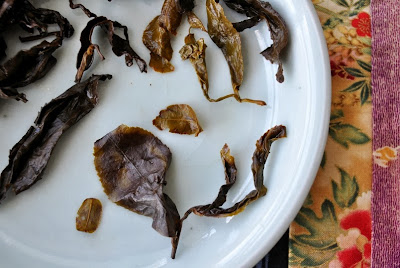Cultivar: Luanze (qingxin) Oolong
Origin: Feng Huang (Dong Ding), Taiwan
Elevation: 700 meters
Harvested by hand on April 2nd, 2013
Process: Organic plantation, high oxidized, rolled and medium roasted.
Competition brewing with 3 grams for 6 minutes.
The most amazing about this tea is its natural, mellow mouthfeel. Even after 6 minutes, there's no uncomfortable bitterness or astringency. This tea tastes sweet and smooth. And, despite the strong flavors, the mouth remains clean and bright. It feels like a sunny afternoon in these tea fields. A taste of nature.
It's feminine and pure like the first kiss of a countryside gal. The pleasure is guilt free (there are no artificial flavors or sugar). It's a real taste. Nothing to be ashamed of, nothing to regret. I love this rich, ripe honey-dipped fruity taste. It's also warm and comforting in its aftertaste. And again, amazingly natural.
The mature leaves are almost completely oxidized. The buds are less oxidized and we can see signs of insect bites confirming the lack of pesticides. This creates this incredible deep taste and fine fragrances. The leaves are not as uniform and neat as usual. This is another sign that this tea field is managed in an organic, natural manner. And it feels!
Below, I have compared three versions of this tea:
Left, the 2011 winter version stored in my qinghua jar.
In the middle, the 2011 winter version stored in a vacuum sealed foil.
Right, the 2013 spring version stored in a vacuum sealed foil.
The color intensity is very similar when the tea is stored in the plastic foils. The teas are very similar. The winter version tastes sweeter, while the spring is more fragrant.
The leaves stored in the porcelain jar produce a much redder color. The tea has evolved and post-oxidized faster in the jar. This results in a deeper and broader aftertaste. I have kept the leaves in this jar for only 6 months approximately.
This comparison confirms that this Concubine Oolong is also a very good candidate for aging. The roasting hasn't turned the leaves stiff, hard, but has dried them sufficiently to improve with time.














1 comment:
I am enjoying a Spring Concubine from Taiwan this very day. Quite lovely!
Post a Comment